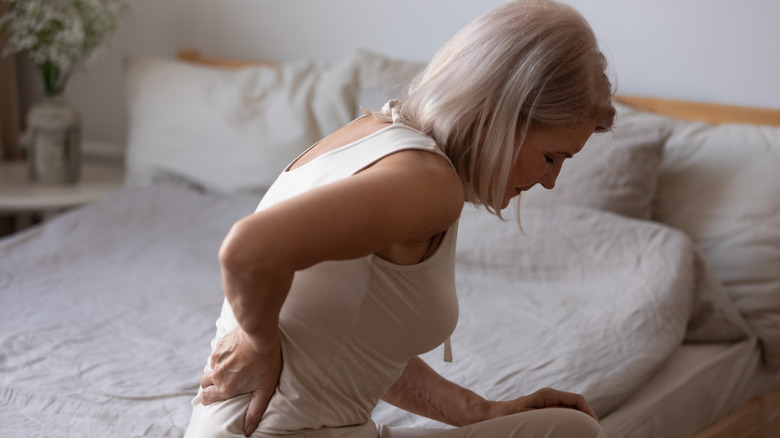When you think about aging and sleep, you often look for bad sleeping habits that are aging you, like drinking too much caffeine at night or not switching off from screen time before bed. Rarely, if ever, do you think about how the aging process itself could be contributing to changes in sleep. That is, until you see your grandmother waking up at the crack of dawn and going to sleep by 7 p.m. Or when your mother seems to wake up in the middle of the night for the slightest sound that hasn’t woken up anyone else in the house. There are explanations for all of these, according to sleep experts.
For starters, hormonal activity in your body changes as you age, explained Isabella Gordan, a certified sleep science coach and co-founder of Sleep Society (via Sleepopolis). Your body isn’t producing as many sleep-regulating hormones (melatonin) as before, and it could also be releasing melatonin a lot earlier in the evening. This is why older people at social gatherings steal away to bed a lot sooner than others. It’s not just melatonin production that decreases as you age. Other hormones that regulate your internal body clock — like the growth hormone — also decrease, according to Gordan. In addition, the part of your brain responsible for your circadian rhythm, the suprachiasmatic nucleus (SCN), ages as you grow older (via Sleep Foundation). All of these changes can lead to poor quality of sleep, more sleep interruptions, and the need to sleep earlier as you age.
Physiological and mental health changes that affect sleep

While menopause is a concern in middle age, people who are older could be dealing with multiple health conditions (like heart disease, diabetes, arthritis, back problems, and acid reflux) that could indirectly affect sleep quality. Pain or discomfort associated with these medical conditions might mean they have trouble getting to sleep or staying asleep. Medications that are prescribed for many of these conditions can also disrupt sleep.
Sleep disorders like sleep apnea are more common in aging adults and conditions like restless legs syndrome can worsen as you grow older too. Neurological diseases like Parkinson’s or Alzheimer’s could also be affecting how well older adults sleep at night (via WebMD). It is also not uncommon for aging adults to feel depressed or anxious; mental health conditions like these can have a profound impact on quality of sleep, too. Social isolation coupled with a lack of physical activity could also negatively impact sleep, per Yale Medicine geriatric and sleep medicine specialist Brienne Miner. A result of aging-related fatigue in itself, long naps can actually take away from quality sleep at night. Feeling the urge to pee more at night as you grow older can also be a culprit.
Miner thinks that addressing the underlying physical, mental health, and other concerns can lead to better sleep at night. Fortunately, aging and its related effects on your body and mind don’t mean that you’re doomed to have bad-quality sleep forever.
Getting better quality of sleep as you age
Some of the advice sleep experts recommend for aging adults also applies to all age groups: Refrain from screen time before bed, get more exercise during the day, establish a relaxing and consistent night-time routine, and avoid alcohol before bed (via Sleep Foundation). “Your body is not as good at metabolizing alcohol as you get older; you can’t drink the same amount in your older age that you could when you were younger. It’s the same with caffeine and nicotine,” explained Brienne Miner (per Yale Medicine).
If physical or mental health concerns are disrupting your sleep, work with your healthcare providers to address your sleep concerns. As for just how much sleep you should be getting at night, there is a popular misconception that older adults don’t require as much sleep as others. But there actually isn’t a whole lot of difference between the sleep time recommended for those between 18 and 64 (7-9 hours of sleep) and those over 65 (7-8 hours of sleep), per National Sleep Foundation. This doesn’t mean you have to still stick to the same sleep times as before, though (via Yale Medicine). If changes in your hormone levels or circadian rhythm dictate that you go to bed at 7 p.m. and wake up at 3 or 4 a.m., there’s nothing wrong with that.
Ultimately, good sleep is a requirement at any age; aging might just mean you have to be more mindful about getting it.